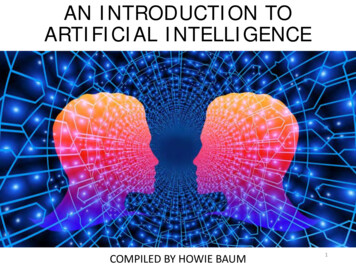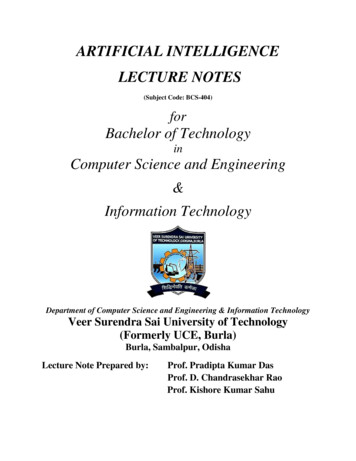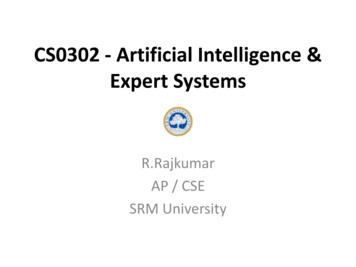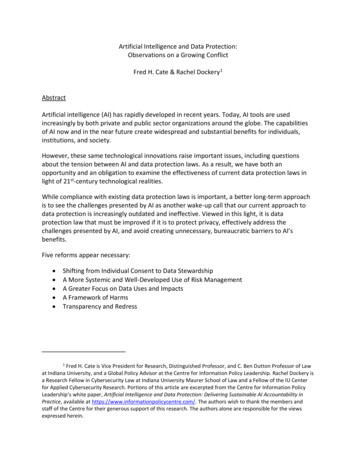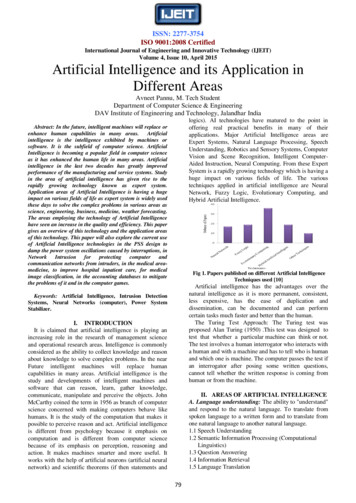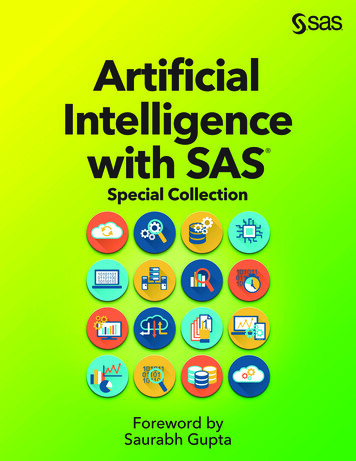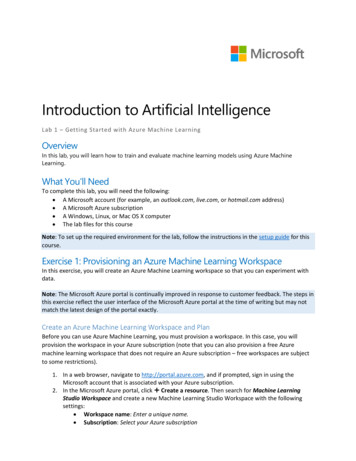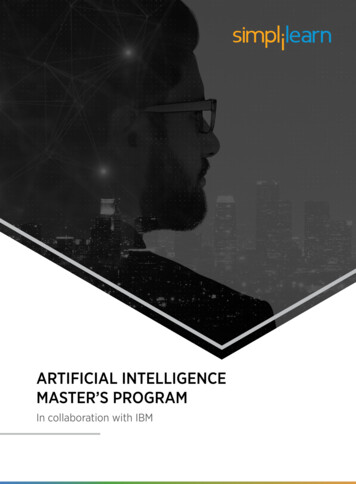
Transcription
ARTIFICIAL INTELLIGENCEMASTER’S PROGRAMIn collaboration with IBMwww.simplilearn.com1 www.simplilearn.com
ContentsAbout the Course03Key Features of Artificial IntelligenceEngineer Master’s Program04About IBM and Simplilearn collaboration05Learning Path Visualization06Program Outcomes07Who Should Enroll09CoursesStep 1: Introduction to Artificial Intelligence10Step 2: Statistics Essential11Step 3: Data Science with Python13Step 4: Machine Learning15Step 5: Deep learning with Keras and TensorFlow17Step 6: Advanced Deep Learning and Computer Vision18Step 7: AI Capstone Project19Electives20Certificates21Classroom-Level Immersion: Delivered Digitally22Customer Reviews23Corporate training242 www.simplilearn.com
About the CourseThis Artificial Intelligence Master’sProgram covers the crucial skillsyou need for a successful career inartificial intelligence (AI). As youundertake your Artificial Intelligencecourse, you’ll master the concepts ofthe machine and deep learning—plusthe programming languages neededto excel in an AI career with exclusivetraining and certification fromIBM. You will learn how to designintelligent models and advancedartificial neural networks; andleverage predictive analytics to solvereal-time problems in this course, incollaboration with IBM.3 www.simplilearn.com
KeyFeaturesPortfolio-worthycapstone demonstratingmastered conceptsIndustry-recognizedcertificates fromIBM and Simplilearn20 in-demandskills15 real-life projectsproviding hands-onindustry training192 hours of instructorled training19 hours of self-pacedlearning4 www.simplilearn.com
About IBM and SimplilearncollaborationThis joint partnership betweenSimplilearn and IBM introducesstudents to an integrated, blendedlearning experience, with thegoal of making them experts inAI and data science. Students willbe industryready for AI and datascience job roles upon successfullycompleting this course. IBM is aleading cognitive solution and cloudplatform company, headquarteredin Armonk, New York, offeringa plethora of technology andconsulting services. IBM invests 6billion in research and developmentannually and has achieved five NobelPrizes, nine US National Medals ofTechnology, five US National Medalsof Science, six Turing Awards, and 10Inductions in the US Inventors Hall ofFame.About SimplilearnSimplilearn is the world’s #1 onlinebootcamp provider that enableslearners through rigorous and highlyspecialized training. We focus onemerging technologies and processesthat are transforming the digital world,at a fraction of the cost and time astraditional approaches. Over one millionprofessionals and 2000 corporate trainingorganizations have harnessed our awardwinning programs to achieve their careerand business goals.5 www.simplilearn.com
Learning Path - Artificial IntelligenceElectivesNatural language processingPython for Data ScienceIndustry Master class- AI engineerIntroduction toArtificial Intelligence(3 hours)StatisticsEssentialsData Sciencewith Python(4 hours)(72 hours)Deep learning with Kerasand TensorFlowMachineLearning(43 hours)(72 hours)Advanced DeepLearning andComputer VisionAI CapstoneProject(56 hours)(41 hours)6 www.simplilearn.com
Artificial Intelligence EngineerMaster’s Program OutcomesLearn about the major applicationsMaster the skills and tools usedof Artificial Intelligence acrossby the most innovative Artificialvarious use cases across variousIntelligence teams across the globefields like customer service, financialas you delve into specializations, andservices, healthcare, etc.gain experience solving real-worldchallenges.Implement classical ArtificialIntelligence techniques such asDesign and build your own intelligentsearch algorithms, neural networks,agents and apply them to createand tracking.practical Artificial Intelligenceprojects including games, MachineLearning models, logic constraintsatisfaction problems, knowledgebased systems, probabilistic models,Gain the ability to apply ArtificialIntelligence techniques for problem-agent decision-making functions andmore.solving and explain the limitationsof current Artificial Intelligencetechniques.7 www.simplilearn.com
Understand the concepts ofLearn to deploy deep learningTensorFlow, its main functions,models on Docker, Kubernetes, andoperations, and the executionin serverless environments (cloud)pipeline.Understand the fundamentals ofUnderstand and master the conceptsNatural Language Processing usingand principles of Machine Learning,the most popular library; Python’sincluding its mathematical andNatural Language Toolkit (NLTK).heuristic aspects.Master and comprehend advancedtopics such as convolutional neuralnetworks, recurrent neural networks,training deep networks, and highlevel interfaces.8 www.simplilearn.com
Who Should Enroll in this Program?With the demand for ArtificialIntelligence in a broad range ofindustries such as banking andfinance, manufacturing, transportand logistics, healthcare, homemaintenance, and customerservice, the Artificial Intelligencecourse is well suited for a varietyof profiles like:Developers aspiring to be an‘Artificial Intelligence Engineer’or Machine Learning engineersAnalytics managers who areleading a team of analystsInformation architects whowant to gain expertisein Artificial IntelligencealgorithmsGraduates looking to build acareer in Artificial Intelligenceand Machine Learning9 www.simplilearn.com
Introduction to Artificial IntelligenceSimplilearn’s Introduction to Artificial Intelligence course is designed tohelp learners decode the mystery of Artificial Intelligence and understandits business applications. The course provides an overview of ArtificialIntelligence concepts and workflows, Machine Learning, Deep Learning,and performance metrics. You’ll learn the difference between supervised,unsupervised learning—be exposed to use cases, and see how clusteringand classification algorithms help identify Artificial Intelligence businessapplications.Key Learning ObjectivesMeaning, purpose, scope, stages, applications, and effects of ArtificialIntelligenceFundamental concepts of Machine Learning and Deep LearningDifference between supervised, semi-supervised and unsupervisedlearningMachine Learning workflow and how to implement the stepseffectivelyThe role of performance metrics and how to identify their essentialmethodsCourse curriculumLesson 1 - Decoding Artificial IntelligenceLesson 2 - Fundamentals of Machine Learning and Deep LearningLesson 3 - Machine Learning WorkflowLesson 4 - Performance Metrics10 www.simplilearn.comSTEP1234567
STEPStatistics EssentialStatistics is the science of assigning a probability to an event basedon experiments. It is the application of quantitative principles tothe collection, analysis, and presentation of numerical data. Ace thefundamentals of Data Science, statistics, and Machine Learning with thiscourse. It will enable you to define statistics and essential terms related toit, explain measures of central tendency and dispersion, and comprehendskewness, correlation, regression, distribution. You will be able to makedata-driven predictions through statistical inference.Key Learning ObjectivesUnderstand the fundamentals of statisticsWork with different types of dataHow to plot different types of dataCalculate the measures of central tendency, asymmetry, and variabilityCalculate correlation and covarianceDistinguish and work with different types of distributionEstimate confidence intervalsPerform hypothesis testingMake data-driven decisionsUnderstand the mechanics of regression analysisCarry out regression analysisUse and understand dummy variablesUnderstand the concepts needed for data science even with Pythonand R!11 www.simplilearn.com1234567
Course curriculumLesson 1 - IntroductionLesson 2 - Sample or population data?Lesson 3 - The fundamentals of descriptive statisticsLesson 4 - Measures of central tendency, asymmetry, and variabilityLesson 5 - Practical example: descriptive statisticsLesson 6 - DistributionsLesson 7 - Estimators and estimatesLesson 8 - Confidence intervals: advanced topicsLesson 9 - Practical example: inferential statisticsLesson 10 - Hypothesis testing: IntroductionLesson 11 - Hypothesis testing: Let’s start testing!Lesson 12 - Practical example: hypothesis testingLesson 13 - The fundamentals of regression analysisLesson 14 - Subtleties of regression analysisLesson 15 - Assumptions for linear regression analysisLesson 16 - Dealing with categorical dataLesson 17 - Practical example: regression analysis12 www.simplilearn.com
STEPData Science with PythonThis Data Science with Python course will establish your mastery ofData Science and analytics techniques using Python. With this Pythonfor Data Science Course, you’ll learn the essential concepts of Pythonprogramming and gain in-depth knowledge in data analytics, MachineLearning, data visualization, web scraping, and natural languageprocessing. Python is a required skill for many Data Science positions,so jump start your career with this interactive, hands-on course.Key Learning ObjectivesGain an in-depth understanding of Data Science processes, datawrangling, data exploration, data visualization, hypothesis building,and testing. You will also learn the basics of statisticsInstall the required Python environment and other auxiliary tools andlibrariesUnderstand the essential concepts of Python programming such asdata types, tuples, lists, dicts, basic operators and functionsPerform high-level mathematical computing using the NumPy packageand its vast library of mathematical functionsPerform scientific and technical computing using the SciPy packageand its sub-packages such as Integrate, Optimize, Statistics, IO, andWeavePerform data analysis and manipulation using data structures andtools provided in the Pandas packageGain expertise in Machine Learning using the Scikit-Learn packageGain an in-depth understanding of supervised learning andunsupervised learning models such as linear regression, logisticregression, clustering, dimensionality reduction, K-NN and pipeline13 www.simplilearn.com1234567
Use the Scikit-Learn package for natural language processingUse the matplotlib library of Python for data visualizationExtract useful data from websites by performing web scraping usingPythonIntegrate Python with Hadoop, Spark, and MapReduceCourse curriculumLesson 1: Data Science OverviewLesson 2: Data Analytics OverviewLesson 3: Statistical Analysis and Business ApplicationsLesson 4: Python Environment Setup and EssentialsLesson 5: Mathematical Computing with Python (NumPy)Lesson 6 - Scientific computing with Python (Scipy)Lesson 7 - Data Manipulation with PandasLesson 8 - Machine Learning with Scikit–LearnLesson 9 - Natural Language Processing with Scikit LearnLesson 10 - Data Visualization in Python using matplotlibLesson 11 - Web Scraping with BeautifulSoupLesson 12 - Python integration with Hadoop MapReduce and Spark14 www.simplilearn.com
STEPMachine LearningSimplilearn’s Machine Learning course will make you an expert in MachineLearning, a form of Artificial Intelligence that automates data analysis toenable computers to learn and adapt through experience to do specifictasks without explicit programming. You will master Machine Learningconcepts and techniques, including supervised and unsupervised learning,mathematical and heuristic aspects, and hands-on modeling to developalgorithms and prepare you for your role with advanced Machine Learningknowledge.Key Learning ObjectivesMaster the concepts of supervised and unsupervised learning,recommendation engine, and time series modelingGain practical mastery over principles, algorithms, and applications ofMachine Learning through a hands-on approach that includes workingon four major end-to-end projects and 25 hands-on exercisesAcquire thorough knowledge of the statistical and heuristic aspects ofMachine LearningImplement models such as support vector machines, kernel SVM,naive Bayes, decision tree classifier, random forest classifier, logisticregression, K-means clustering and more in PythonValidate Machine Learning models and decode various accuracymetrics. Improve the final models using another set of optimizationalgorithms, which include Boosting & Bagging techniquesComprehend the theoretical concepts and how they relate to thepractical aspects of Machine Learning15 www.simplilearn.com1234567
Course curriculumLesson 1: Introduction to Artificial Intelligence and Machine LearningLesson 2: Data PreprocessingLesson 3: Supervised LearningLesson 4: Feature EngineeringLesson 5: Supervised Learning-ClassificationLesson 6: Unsupervised learningLesson 7: Time Series ModellingLesson 8: Ensemble LearningLesson 9: Recommender SystemsLesson 10: Text Mining16 www.simplilearn.com
Deep learning with Keras and TensorFlowThis Deep Learning with TensorFlow course by IBM will refine yourmachine learning knowledge and make you an expert in deep learningusing TensorFlow. Master the concepts of deep learning and TensorFlowto build artificial neural networks and traverse layers of data abstraction.This course will help you learn to unlock the power of data and prepareyou for new horizons in AI.Key Learning ObjectivesUnderstand the difference between linear and non-linear regressionComprehend convolutional neural networks and their applicationsGain familiarity with recurrent neural networks (RNN) andautoencodersLearn how to filter with a restricted Boltzmann machine (RBM)Course curriculumLesson 1 - Introduction to TensorFlowLesson 2 – Convolutional Neural Networks (CNN)Lesson 3 – Recurrent Neural Networks (RNN)Lesson 4 - Unsupervised LearningLesson 5 - Autoencoders17 www.simplilearn.comSTEP1234567
STEPAdvanced Deep Learning andComputer VisionTake the next big step toward advancing your deep learning skills withthis high-level course. This Advanced Deep Learning and Computer Visioncourse covers real applications of computer vision, generative-adversarialnetworks (GANs), distributed and parallel computing with GPUs, anddeployment of deep learning models on cloud.Key Learning ObjectivesLearn how to filter with restricted Boltzmann machines (RBMs)Work on image translation with GANEncode, decode, and denoise images with autoencodersUnderstand the structure and function of neural networks and CNNs/poolingDetect objects in images with You Only Look Once (YOLOv3)Learn to deploy deep learning models on Docker, Kubernetes, and inserverless environments (cloud)Course curriculumLesson 1 - Course IntroductionLesson 2 - Prerequisites for thecourseLesson 3 - RBM and DBNsLesson 4 - Variational AutoEncoderLesson 5 - Working with DeepGenerative ModelsLesson 6 - Applications: Neural StyleTransfer and Object DetectionLesson 7 - Distributed & ParallelComputing for Deep Learning ModelsLesson 8 - Reinforcement LearningLesson 9 - Deploying Deep LearningModels and Beyond18 www.simplilearn.com1234567
Artificial Intelligence Capstone ProjectSimplilearn’s Artificial Intelligence Capstone project will allow you toimplement the skills you learned in the masters of Artificial Intelligence.With dedicated mentoring sessions, you’ll know how to solve a realindustry-aligned problem. You’ll learn various Artificial Intelligence-basedsupervised and unsupervised techniques like Regression, SVM, Tree-basedalgorithms, NLP, etc. The project is the final step in the learning path andwill help you to showcase your expertise to employers.Key Learning ObjectivesSimplilearn’s online Artificial Intelligence Capstone course will bring youthrough the Artificial Intelligence decision cycle, including ExploratoryData Analysis, building and fine-tuning a model with cutting edgeArtificial Intelligence-based algorithms and representing results. Theproject milestones are as follows:Exploratory Data Analysis - In this step, you will apply various dataprocessing techniques to determine the features and correlationbetween them, transformations required to make the data sense,new features, construction, etc.Model Building and fitting - This will be performed using MachineLearning algorithms like regression, multinomial Naïve Bayes, SVM,tree-based algorithms, etc.Unsupervised learning - Clustering to group similar kind oftransactions/reviews using NLP and related techniques to devisemeaningful conclusions.19 www.simplilearn.comSTEP1234567
Elective CourseNatural language ProcessingThis Natural Language Processing course will giveyou a detailed look at the science behind applyingMachine Learning algorithms to process large amountsof natural language data. You will learn the concepts ofNatural Language understanding, Feature Engineering,Natural Language Generation, Speech Recognitiontechniques.Python for Data ScienceKickstart your learning of Python for Data Sciencewith this introductory course and familiarize yourselfwith programming. Carefully crafted by IBM, uponcompletion of this course you will be able to writeyour Python scripts, perform fundamental hands-ondata analysis using the Jupyterbased lab environment,and create your own Data Science projects using IBMWatson.Industry Master Class – Artificial IntelligenceAttend this online interactive industry master class togain insights about advancements in Data Science, AIand Machine Learning techniques.20 www.simplilearn.com
CertificatesC E R T I F I C AT EO F AC H I E V E M E N TARTIFICIALINTELLIGENCE ENGINEERT H I S I S T O C E R T I F Y T H ATJOHN DOEHas successfully graduated from the Course Name MastersProgram summa cum laude having completed all mandated courserequirements and industry projects with distinction.Date: / /2021Krishnana Kumar,Kumar CEOUpon completion of this Master’s Program, you will receive the certificates fromIBM and Simplilearn for the AI courses in the learning path. These certificateswill testify to your skills as an expert in artificial intelligence. Upon programcompletion, you will also receive an industry recognized Master’s Certificatefrom Simplilearn.21 www.simplilearn.com
Classroom-Level Immersion:Delivered ive,InteractiveClassesHands-OnExperienceOnline Enrollment andAccess on Web and MobileLearner Watchesthe VideoChapter-EndQuizzesLive VirtualClassroomLive Interactionand lilearn Certification Criteria85%CourseCompletion 80%Score onSimulation Exam Internal, andExternalCertificationProject Submittedand AcceptedFinal Exam andCertification22 www.simplilearn.com
Customer ReviewsVishwanath RaghaThe awesome learning experience with Simplilearn. I amin the Artificial Intelligence Engineer Master’s Program. Sofar, I have completed up to the Data Science with Pythoncourse. All the courses are well structured with self-learning,live classes, and assessment. The trainers are good, connectto students, and answer questions. Happy learning.Janani VarunI would give a 5-star rating for the Simplilearn course Itook. It helps me understand the content easily throughonline self-learning videos, and trainers assist us with theirenriched knowledge, as well.Leena JayamohanI took the AI Master’s program, which consisted of multipleclasses. Overall the teachers knew the subject and coveredwhat was promised. The industry-related projects wereexcellent, and it helped put into practice what we learnedin the class. I would recommend these classes to anyoneplanning to enter the Data Analytics field.23 www.simplilearn.com
Corporate TrainingTop clients we work with:Features of Corporate Training:Tailored learning solutionsFlexible pricing optionsEnterprise-grade learning management system (LMS)Enterprise dashboards for individuals and teams24X7 learner assistance and support24 www.simplilearn.com
USASimplilearn Americas, Inc.201 Spear Street, Suite 1100, San Francisco, CA 94105United StatesPhone No: 1-844-532-7688INDIASimplilearn Solutions Pvt Ltd.# 53/1 C, Manoj Arcade, 24th Main, Harlkunte2nd Sector, HSR LayoutBangalore - 560102Call us at: 1800-212-7688www.simplilearn.com SL-LP-33-117-20210425 www.simplilearn.com
Master’s Program Outcomes Learn about the major applications of Artificial Intelligence across various use cases across various fields like customer service, financial services, healthcare, etc. Implement classical Artificial Intelligence techniques such as search algorithms, neural net
